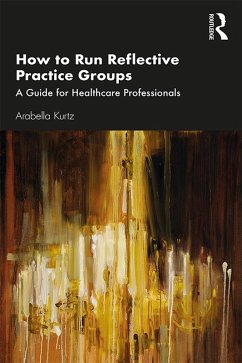Kurtz presents a fully developed, eight-stage model: The Intersubjective Model of Reflective Practice Groups. The book offers a guide to the organisation, structure and delivery of group sessions, with useful suggestions for overcoming commonly-encountered problems and promoting empathic relationships with clients and colleagues.
Dieser Download kann aus rechtlichen Gründen nur mit Rechnungsadresse in A, B, BG, CY, CZ, D, DK, EW, E, FIN, F, GR, HR, H, IRL, I, LT, L, LR, M, NL, PL, P, R, S, SLO, SK ausgeliefert werden.
"Dr. Kurtz offers an illustrative, comprehensive, and meaningful approach to reflective practice. Learning opportunities abound from reading the rich examples to applying the model to a healthcare setting." - Nicholas Ladany, Dean of the School of Leadership, University of San Diego, USA
"Dr Kurtz brings her wealth of clinical expertise and experience to this excellent new book. While it is an eminently practical manual, grounded within NHS culture and steeped in clinical practice, it is also clearly underpinned by the relevant theoretical influences and empirical research. This makes it an important new addition to the field of Reflective Practice, which is long overdue. I wish it had been available to me!" - Delia Cushway, Emeritus Professor of Clinical Psychology, Coventry University, UK
"If you want to explore group reflective practice this book is essential reading for nurses and other healthcare professionals. In today's pressured healthcare environment, reflective practice has never been more important to provide time to think and learn. This book and the Intersubjective Model of Reflective Practice opens up new possibilities." - Dave Clarke, Foundation Professor of Nursing,
University of Leicester, UK
"Arabella Kurtz makes a compelling case for the place of reflective practice in healthcare settings and in the training of healthcare professionals. She has drawn on her considerable experience as well as theory to produce a clear Intersubjective Model for reflective practice. Each stage of the model is described in separate chapters which provide excellent guidance and examples of what to do as a facilitator. The first stage deals uniquely with the organisational and contractual issues that so often interfere with the establishment and effective running of reflective groups. The remaining stages guide the reader through the essential tasks of reflective groups. If services are to develop a culture of compassionate care then reflective practice should be integral and this book provides a model for how this could be achieved." - Tony Lavender, Emeritus Professor of Clinical Psychology, Canterbury Christ Church University, UK
"Reflective practice is increasingly proffered as a panacea to the pressures on healthcare staff of rising clinical demand, financial austerity and a target driven culture, yet it is poorly defined and often difficult to implement. Based on years of working with the lived experience of practitioners in an extensive range of settings, Kurtz has developed a unique, yet widely applicable, intersubjective model of reflective practice integrating experiential, psychoanalytic, and phenomenological approaches. By allowing a space for intuition, emotional responsiveness and creativity to develop, staff groups are facilitated in deepening their understanding of human relationships and finding meaning in their work. This book offers an accessible, practical and much-needed guide to reflective practice which will be relevant to all disciplines working in health and social care services." - Jessica Yakeley, Consultant Psychiatrist in Forensic Psychotherapy and Director of the Portman Clinic, Tavistock and Portman NHS Foundation Trust, UK
"Dr Kurtz brings her wealth of clinical expertise and experience to this excellent new book. While it is an eminently practical manual, grounded within NHS culture and steeped in clinical practice, it is also clearly underpinned by the relevant theoretical influences and empirical research. This makes it an important new addition to the field of Reflective Practice, which is long overdue. I wish it had been available to me!" - Delia Cushway, Emeritus Professor of Clinical Psychology, Coventry University, UK
"If you want to explore group reflective practice this book is essential reading for nurses and other healthcare professionals. In today's pressured healthcare environment, reflective practice has never been more important to provide time to think and learn. This book and the Intersubjective Model of Reflective Practice opens up new possibilities." - Dave Clarke, Foundation Professor of Nursing,
University of Leicester, UK
"Arabella Kurtz makes a compelling case for the place of reflective practice in healthcare settings and in the training of healthcare professionals. She has drawn on her considerable experience as well as theory to produce a clear Intersubjective Model for reflective practice. Each stage of the model is described in separate chapters which provide excellent guidance and examples of what to do as a facilitator. The first stage deals uniquely with the organisational and contractual issues that so often interfere with the establishment and effective running of reflective groups. The remaining stages guide the reader through the essential tasks of reflective groups. If services are to develop a culture of compassionate care then reflective practice should be integral and this book provides a model for how this could be achieved." - Tony Lavender, Emeritus Professor of Clinical Psychology, Canterbury Christ Church University, UK
"Reflective practice is increasingly proffered as a panacea to the pressures on healthcare staff of rising clinical demand, financial austerity and a target driven culture, yet it is poorly defined and often difficult to implement. Based on years of working with the lived experience of practitioners in an extensive range of settings, Kurtz has developed a unique, yet widely applicable, intersubjective model of reflective practice integrating experiential, psychoanalytic, and phenomenological approaches. By allowing a space for intuition, emotional responsiveness and creativity to develop, staff groups are facilitated in deepening their understanding of human relationships and finding meaning in their work. This book offers an accessible, practical and much-needed guide to reflective practice which will be relevant to all disciplines working in health and social care services." - Jessica Yakeley, Consultant Psychiatrist in Forensic Psychotherapy and Director of the Portman Clinic, Tavistock and Portman NHS Foundation Trust, UK


